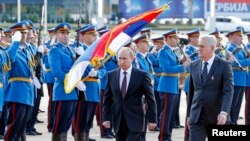Russian President Vladimir Putin is in Serbia as the guest of honor at a military parade in Belgrade marking 70 years since the city's liberation by the Red Army from Nazi occupation.
The visit, filled with pomp and seen as playing well for Putin at home, presents somewhat of a quandary for Serbia, on the one hand pursuing membership in the European Union, and on the other feeling an obligation to demonstrate reverence for a historical ally, with whom it shares its Orthodox faith and conservative values.
Serbia’s dilemma is further exacerbated by Russia’s international isolation over the conflict in eastern Ukraine, where Moscow is widely seen as having fomented and directly supported a separatist rebellion as part of efforts to destabilize the country for cutting ties with Moscow in favor of a pro-Europe course.
“Serbia will not compromise its morals with any kind of bad behavior towards Russia,” Serbian President Tomislav Nikolic told Putin Thursday after they placed wreaths at a memorial to fallen Soviet soldiers in Belgrade.
Serbia has refused to sign on to Western sanctions against Russia over Ukraine, despite EU pressure to align its foreign policy with the 28-nation bloc it hopes to join.
Putin, in turn assured his host that Russia “will always see Serbia as our closest ally.”
The parade marking the liberation of Belgrade is Serbia’s first in nearly 30 years. It was held four days early to accommodate Putin's schedule as the actual anniversary falls on October 20.
The U.S. ambassador to Serbia, Michael Kirby, was invited to the event but the United States embassy said he would not attend.
Ukraine crisis
From Belgrade, Putin will travel to an Asia-Europe summit in Italy, where the ongoing crisis in Ukraine is expected to dominate the agenda.
During the two-day meeting in Milan, the Russian leader will hold a series of talks with his European counterparts, beginning late Thursday with German Chancellor Angela Merkel. On Friday, he will participate in a breakfast meeting with Ukrainian President Petro Poroshenko and other European leaders.
The talks will likely focus on the shaky cease-fire in eastern Ukraine between government forces and pro-Russia rebels, as well as the resumption of Russian natural gas deliveries to Ukraine. Moscow halted gas flows to its neighbor in June, over what it says are more than $5 billion in unpaid Ukraine energy bills.
The dispute could also affect Russian natural gas shipments to the European Union during the upcoming winter season. Europe receives a third of its gas needs from Russia, around half of which comes via Ukrainian pipelines.
Commenting on the issue in Belgrade, Putin said Russia will reduce gas supplies to Europe if Ukraine is found siphoning off gas to cover its own needs, but added he was "hopeful" it would not come to that.
Meanwhile, EU officials say they could prevent gas shortages this winter based on a vulnerability test conducted by the bloc with 10 neighboring countries. The test simulated a six-month supply cut from Russia.
If properly implemented, “no household in the EU has to be left out in the cold this winter,” EU Energy Commissioner Guenther Oettinger said unveiling the test results Thursday in Brussels.
In the run-up to the Milan summit, Putin early this week ordered more than 17,000 troops to withdraw from an area near the Ukrainian border. Kyiv, which along with its Western allies has accused Russia of having sent military units and weapons into Ukrainian territory, has said it has not seen any significant troop movements.
Russia has consistently denied the presence of its troops inside Ukraine, while separatist rebel leaders say they have been helped by Russian soldiers.
Some material for this report came from Reuters.





